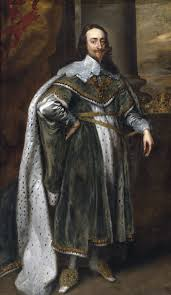Charles I - Wider Historical Context
From the moment the crown was placed on the head of Charles I, resentment against the king started simmering. Opposition to Charles I gradually mounted as he launched a series of deeply inflammatory religious and economic policies. By 1642, people were so disgruntled that they risked their lives to fight against the King during the English Civil War.
From the start of his reign, Charles was blighted by poor finances. His first parliament refused to grant Charles tonnage and poundage (a collection of duties and levies) for life. This was a provocative move: traditionally parliament granted tonnage and poundage to a new king for life. The parliament was worried about Charles’ war-mongering proclivities.
Charles, egged on by the Duke of Buckingham, embarked on a number of financially draining foreign ventures. These had little positive impact and encouraged him to introduce forced loans for the gentry. Those who did not pay could be imprisonment.
Charles’ financial position worsened in the 1930s. The whole of Europe was experiencing an economic slump. The Dutch were a great trading competitor. To improve Charles’ financial prospects, the Lord Treasurer Portland attempted to enforce the king’s feudal rights. The old Law of the Forest was strictly enforced which enabled Charles to collect money through fines. In 1637, the circumference of the Forest of Rockingham was extended from six to sixty miles. Neighbouring gentry were fined £51,000 for violating a medieval law that had virtually been forgotten.

Portland enforced a medieval law that stipulated that anyone with freehold land worth £40 or more who had not applied for a knighthood at the coronation of Charles would be fined. Offices were also sold.
No parliament sat from 1629 to 1640 (the period of Charles’ personal rule) and the king decided that there was no reason for rural gentry and nobility to come to London. He issued a proclamation on 20 June 1632 stating that any rural noble or gentry found in London could be fined up to £1,000. Many members of the gentry felt targeted by Charles.
Charles also alienated influential merchants in the City of London. In 1936, Charles ordered the prosecution of the Common Council in Star Chamber on a minor technical issue which members in the Common Council had infringed. This led to a £70,000 fine. In 1639 this fine was reduced to £12,000. This was paid and Charles swiftly handed the money over to Henrietta Maria, his wife, as a birthday present. Unsurprisingly, when Charles asked the City of London for a loan in 1640, they refused.
In 1635 Charles implemented his most controversial money raising venture: the Ship Tax. Before Charles’ reign, the levy was only raised in coastal areas in times of war. Charles raised money with the levy in peacetime across the whole nation. Between 1634 and 1638 this levy raised £150,000 to £200,000 per year. This tax was paid by relatively poor people as well as the rich. People who refused to pay could be imprisoned.
The King’s dodgy financial position was thrown into harsh light during the Bishop’s Wars (1638-40), his conflict against the Scottish Covenanters. Charles did not have the necessary funds to fight this war and was finally forced to recall Parliament. Parliament only agreed to help the king if he agreed to certain conditions, including the trials of Laud and Strafford.
Charles’s ‘religious innovations’ were deeply contentious. He was suspected of housing Catholic sympathies: he married a Catholic woman, Henrietta Maria, and rejected stripped-back religious ceremonies in favour of the elaborate High Anglican form of worship. In 1937, his attempt to introduce to Scotland the new Book of Common Prayer - which shunned minimalist styles of worship - caused outrage and provoked a war. The Covenanters, formed of men who opposed Charles’ religious policies in Scotland, fought and defeated Charles I's troops in the Bishops' War.
Charles summoned Parliament in April 1640 and November 1640 to raise funds for the war. When the Long Parliament met in November 1640, most of its members were deeply unimpressed by Charles’s religious and financial policies. The King’s minister, Thomas Wentworth, Earl of Strafford, was loathed by members of Parliament. He had said that Charles should be “loosed and absolved from all rules of Government” for his conflict with the Covenanters. Parliament demanded that Stafford and the Archbishop of Canterbury, William Laud, be tried.
The Condemnation of Stafford
Stafford was condemned to death at an impeachment trial before the Lords in March and April of 1641. The Archbishop of Canterbury, William Laud, was impeached in May 1641, at the same time as the 'Root and Branch' Bill was introduced by Henry Vane the Younger and Oliver Cromwell in parliament. This bill urged the removal of the bishops from the Church of England, and called for the Church to be reformed in line with Scottish-style Presbyterianism. It was defeated, but the Bishop Exclusion Act was passed in 1941, which excluded Bishops from the House of Lords.
Laud was executed in 1645 during the Civil War.
In 1642, the English Civil Wars erupted against this long-term backdrop of financial, religious and political friction between King and country.
See also: Who executed Charles
MLA Citation/Reference
"Charles I - Wider Historical Context". HistoryLearning.com. 2026. Web.
